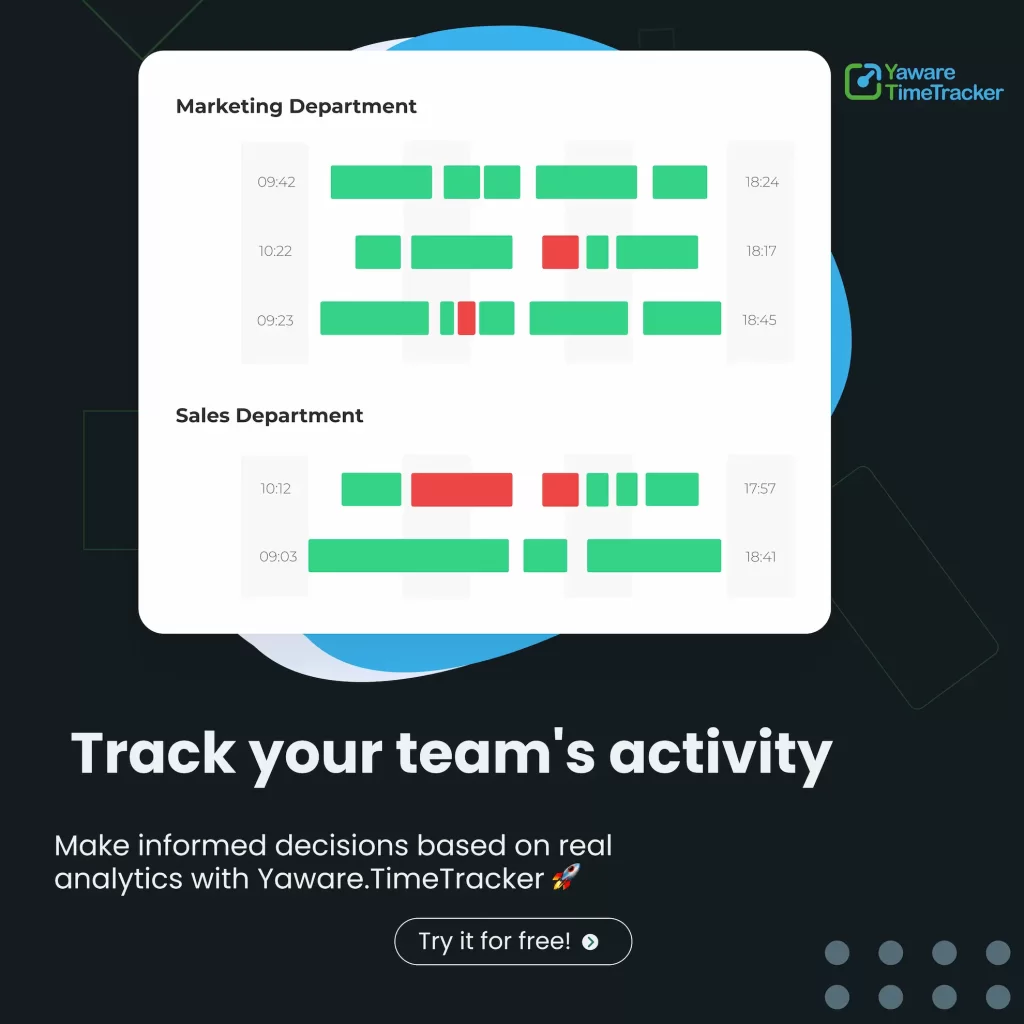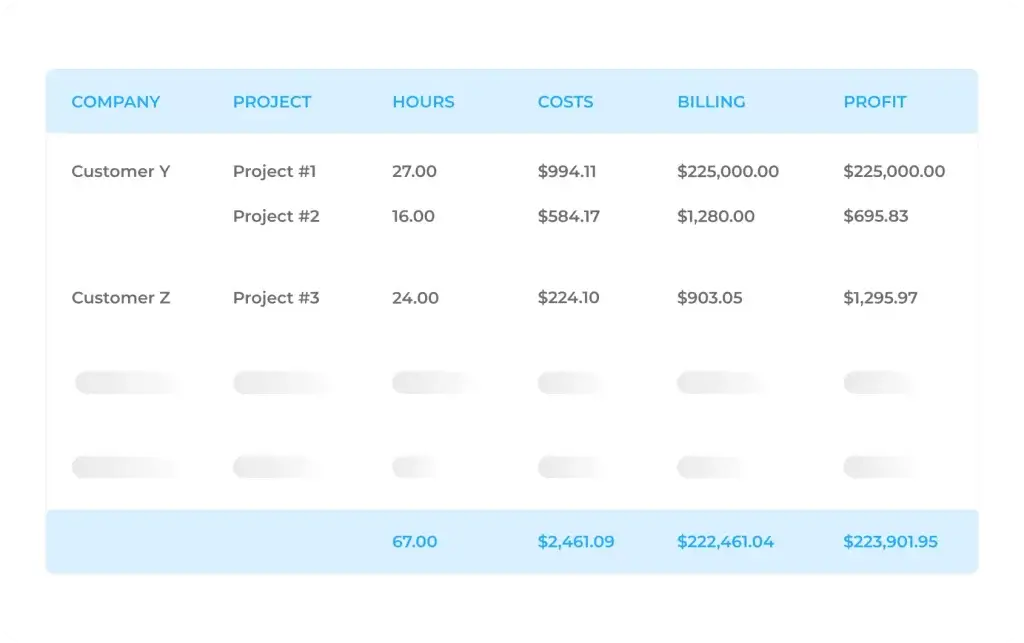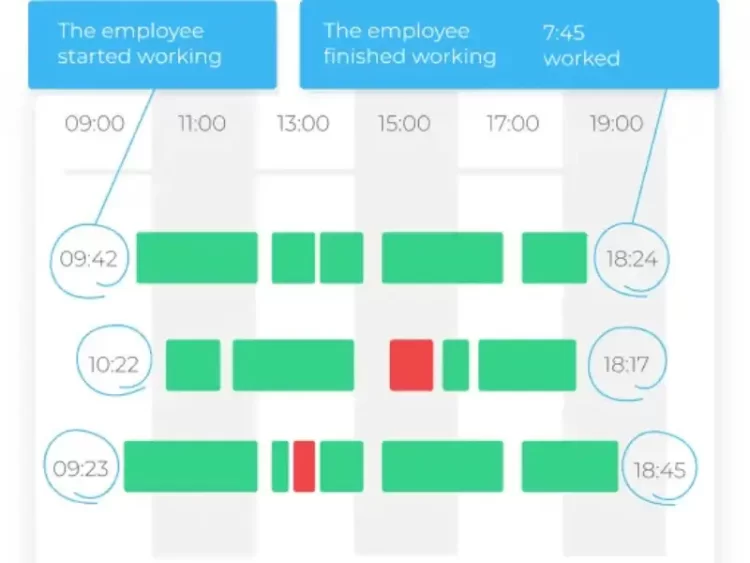Why Time Tracking Matters in 2025
As businesses continue evolving with hybrid work models and distributed teams, effective time tracking has become essential for maintaining productivity and accountability. The market for time tracking solutions is expanding rapidly in 2025, with advanced AI features and deeper integration capabilities transforming how companies monitor and optimize their most valuable resource—time.
Modern time tracking tools now provide much more than simple hour logs. They deliver actionable insights into workflow efficiency, project profitability, and resource allocation. For decision-makers evaluating these solutions, understanding the unique strengths of each platform is crucial.
Let's explore the top 10 time tracking tools of 2025 to help you find the perfect fit for your business needs.
1. Yaware TimeTracker
Yaware TimeTracker stands as the comprehensive solution that addresses the full spectrum of business time management needs. Its automatic activity categorization transforms raw time data into strategic insights without requiring manual input from employees. The platform features a real-time dashboard giving leadership immediate visibility into team productivity and identifies workflow inefficiencies that would otherwise remain hidden.

Businesses implementing Yaware typically report productivity improvements of 15-30% within the first three months. The system excels with its non-intrusive tracking approach and robust privacy controls that maintain employee trust while providing managers with essential productivity data. Yaware's straightforward implementation gets teams operational within hours rather than days or weeks, making it ideal for companies seeking rapid deployment.
2. Beebole

3. Toggl Track
Toggl Track remains a popular choice for its clean, intuitive interface and exceptional cross-platform compatibility. The tool shines with its one-click time tracking and impressive reporting capabilities that break down time usage across projects, clients, and team members.
Small to medium-sized businesses particularly appreciate Toggl's scalable pricing model and the minimal learning curve for new users. While not as comprehensive in automated tracking as Yaware, Toggl's browser extensions and integration ecosystem make it a solid option for teams that prefer straightforward time logging with minimal overhead.
4. Harvest
Harvest distinguishes itself by deeply integrating time tracking with invoicing and expense management. This platform excels for service-based businesses that bill by the hour, automatically generating invoices based on tracked time and maintaining meticulous financial records.
Its visual reporting provides immediate clarity on project budgets versus actual time spent, helping prevent scope creep and budget overruns. Harvest's strength lies in this financial focus rather than the productivity analysis offered by platforms like Yaware.
5. Time Doctor
Time Doctor focuses on accountability with its screenshot capabilities and detailed activity monitoring. The platform appeals to companies managing large remote teams where oversight remains a priority.
Its distraction alerts and app usage tracking help employees maintain focus throughout the workday. While comprehensive in monitoring capabilities, Time Doctor requires more active management than fully automated solutions like Yaware, making it better suited for organizations with dedicated oversight personnel.
6. Clockify
Clockify maintains popularity as the leading free time tracking solution with unlimited users and projects. The platform delivers solid basic functionality including manual time entry, reporting, and team management capabilities.
While lacking the advanced AI analytics of premium tools like Yaware, Clockify's accessibility makes it an excellent entry point for small businesses or startups exploring time tracking for the first time. Its premium tiers add features gradually, allowing organizations to scale their investment as they grow.
7. ClickTime
ClickTime specializes in resource planning alongside time tracking, with superior forecasting tools that help managers anticipate staffing needs and prevent burnout. The platform emphasizes its approval workflows and budgeting capabilities.
Its industry-specific templates for professional services, nonprofits, and government contractors provide tailored experiences that eliminate setup time. While effective in its niche, ClickTime doesn't offer the comprehensive productivity insights found in Yaware's automatic activity categorization.
8. RescueTime
RescueTime focuses entirely on personal productivity enhancement through passive tracking and detailed Focus Work analysis. The platform automatically categorizes applications and websites as productive or distracting based on customizable rules.
The tool excels in providing individuals with insights into their working patterns and digital habits, though it lacks the team management features that make platforms like Yaware ideal for organizational deployment. RescueTime works best for self-directed professionals or as a complement to more comprehensive team tracking solutions.
9. DeskTime
DeskTime emphasizes productivity tracking with automatic application categorization and detailed absence management. Its unique “productivity percentage” calculations provide an at-a-glance metric for team performance.
The platform includes project tracking and custom report generation, though with less depth than Yaware's analytics. DeskTime's integrated shift scheduling and absence calendar make it particularly suitable for companies with complex staffing requirements or hourly employees.
10. TimeCamp
TimeCamp stands out with its exceptional project management integration ecosystem and automated billing capabilities. The platform's flexibility in tracking methods—from automatic monitoring to manual entry and dedicated desktop widgets—accommodates diverse team preferences.
Its keyword-based time allocation automatically assigns time to the appropriate projects without manual switching, saving valuable minutes throughout the workday. While comprehensive, TimeCamp requires more configuration than the more intuitive setup process offered by Yaware.
11. Hubstaff
Hubstaff combines time tracking with field service management through its GPS capabilities and geofencing features. This makes it uniquely suited for businesses with mobile workforces or multiple locations.
The platform's automated payroll processing based on tracked hours streamlines administrative tasks for companies with hourly employees. While powerful for distributed physical teams, Hubstaff's emphasis on location tracking makes it less focused on the deep productivity analytics that define Yaware's approach.
Choosing the Right Time Tracking Solution
When evaluating these top time tracking tools, consider your specific business requirements around team size, work environment, integration needs, and reporting depth. While each platform offers unique advantages, Yaware TimeTracker delivers the most comprehensive solution with its balance of easy implementation, automatic tracking, and actionable productivity insights.
As businesses navigate the complexities of modern work environments throughout 2025, implementing the right time tracking solution will remain essential for maintaining productivity, ensuring accountability, and driving continuous improvement through data-driven insights.

